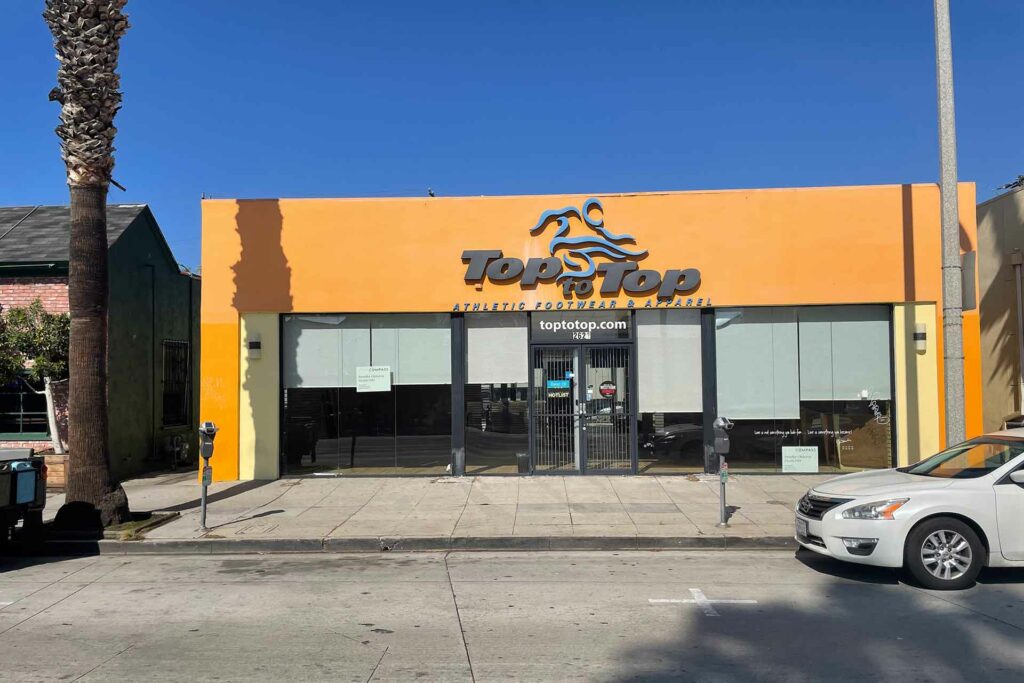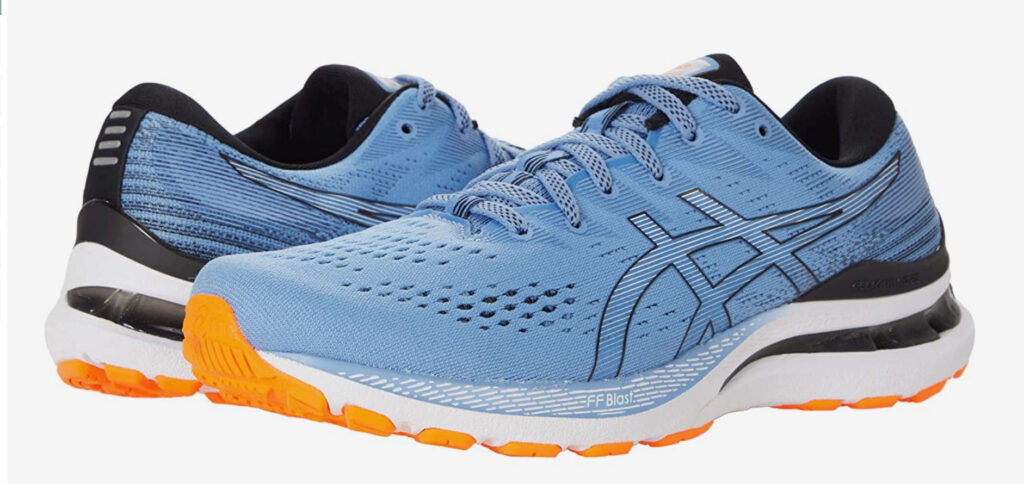One of my stated goals as a consumer is to support local retailers. Sure, I buy my fair share of crap from Amazon.com just like everybody else but when possible, I try to shop local. One store that I used to love was called Top To Top which was a serious runner’s store. I used to buy the top of the line New Balance shoes across the street at their company-run retail store until a good friend of mine suggested that I “get fitted” at Top To Top across the street (and directly next to the actual bar featured in the television show It Is Always Sunny In Philadelphia). They got me into top of the line Asics running shoes that were not just 4E wide but a full size larger. That level of extra service earned me as a loyal, retail-priced local customer who burns through a pair of $180 running shoes every six months or so.

These shoes are a special order even at the Asics store in the Century City Mall (post-billion-dollar-plus renovation) as most places aren’t going to inventory shoes that big and that wide. I was fine with that fact but right before COVID, the store changed its policy to require the customer to a) prepay for his or her shoes b) order in person and c) pick them up in person. I protested this new policy on what would turn out to be my last trip to Top To Top as I suggested that my (or really anyone’s) time is worth money and that this new policy was an abject and unnecessary waste of time. The salesman and the manager couldn’t care less and I actually didn’t order my shoes from them in an act of economic protest. My young son and I left the store and went home where I went to Ascics.com and got exactly what I needed, at a better price, with free 2-day shipping etc…
I was driving down Wilshire Boulevard in Santa Monica a week or so en route to the Verizon store to get a new iPhone and I noticed that Top To Top was not in business anymore. I wasn’t shocked as they made the mistake of forgetting that the customer comes first.
Audiophile dealers can get into the same trouble in that “flooring” (meaning buying demo or backup inventory) gear is very expensive. What’s more expensive is not having anything to sell because just like a $180 pair or running shoes – an audiophile can realistically buy his or her gear anywhere. As a publication, we don’t promote going out of town versus supporting your local dealer but we all know that some people go out of state to make bigger purchases as an effort to save money on sales tax. The now-departed Philadelphia retailer, SoundEx, was a great example of this. They sold literally each and every A-list audiophile brand and had a ton of gear on display. They also would discount as aggressively as anyone in Manhattan but they didn’t have any sales tax and they would drive your gear up to New York that coming week. The difference with SoundEx was they had actual inventory. The price was right, too. They always had the really good stuff and you never really had to wait for your audiophile fix. It was only until they make the age-old mistake of opening a “build it and they will come” 23 room audiophile Mecca did they get in trouble. History has proven that nobody wants the build it and they will come audio salon as it has failed over and over in locations all over the world. Lower overhead paired with excellent service and products is what people really want and what they will support.

No audiophile dealer can floor every product that they sell but they should have some of the key items in-store and perhaps ready to send home with a willing client. Headphones are an easy score. Having a few dozen pair of top performing headphones makes for a good “add on” sale for anyone who loves music and-or audio that walks into your store. Having a few AV receivers is always a good idea too – not a ton but the key two or three that you really like because who knows when the next shortage will be? With COVID-era scarcity, having some key source components like Rokus or Apple TVs is a good idea to keep in inventory. Those aren’t expensive but are essential a) keeping your clients out of the big-box stores and b) happy with their solution being in-store thus rewarding them for visiting. Having a few pairs of your best-selling speakers helps motivate the sales team to sell what’s in stock and might just inspire a client to take a pair home to test them in their room because nearly all of those tests end in a sale.
When I sold Wilson Audio back in the early 1990s, I made a deal with my manufacturer’s sales rep that was a total win-win. At no cost to us, he would send me any inventory that was B-stock, an over-run in production or a return. In the middle of a recession, I was still able to find a good volume of people to spend $12,900 on a pair of Wilson Audio WATT/Puppy 3/2s. I played Wilsons for anybody who would sit down and listen because of this fact. And a fair number of them bought them including people who had never heard of the legendary brand. That store also kept a good volume of Transparent Cable to sell right in the moment. Enthusiasts came in looking for their audiophile fix and without having the gear in stock – you couldn’t make that impulse sale. Thanks to these companies enlightened view of inventory – we did pretty well. The rise of the custom installer also came the era of the special order which seems good for the retailer because they only order gear that they sell but in reality, it is a bad policy as it kills off impulse and day-of sales.
Having a retail location with strong foot traffic is a great perk but in so many parts of the country – such commercial real estate locations don’t make monetary sense. What is more important than the location of a store is what’s in it. Do you have the latest and greatest gear on display? Do you have well paid and highly experienced salespeople? Do you have key components in stock? These factors all help in building the loyalty with your local customers. And is 100 reasonable to ask your clients for their loyalty. Explain to them how you run your business and how important it is that they support you.
Show consumer what you can do for them versus Amazon.com or Cost-Co or any number of warehouse/catalog resellers. These other players can’t install a new TV – that day – the way that we used to at Bryn Mawr Stereo back in Philly. We’d open somewhat early on a Sunday and before the Birds played – we’d pop a few Mitsubishi and Sony XBR big screens because we could deliver them. Our delivery trucks actually had an extra big screen (that was what people bought back in the late 1980s or early 1990s) on it to facilitate such in-the-moment sales. People loved the immediacy of what we delivered. I would finish work at 9 PM and go to a client’s house and setup his or her gear. Not only did I put a few hundred extra dollars but I never had to deal with returns with these happy clients.
Deep down inside, I think we all want to support our local retailers. With that said – they need to earn our loyalty. Having inventory on key products is a good way to earn said consumer loyalty. Price likely isn’t enough. Being the only dealer nearby will have people Googling the nearest dealer in another state. Finding a way to feed an audiophile’s AV jones in short order is a much better, more effective way to earn the loyalty that keeps the doors open and pays all of the bills.




Sos from this writer. I’m amazed at how many times you can recycle a story
in one form or another. Just substitute the type of business.
I guess I am like the AC-DC of audiophiles.
How many hit songs can they write with the same three chords?
Jerry,
I too used to shop both ToptoTop and the Runner’s store on Washington Blvd. near the beach when I lived in MDR and had similar positive experiences and inventory challenges at both. Now, I live in Denver. When you tour our fair city, I encourage you to visit, Runner’s Roost:
https://runnersroost.com/
You will feel right at home, as this store reminds me most of ToptoTop. What you’ll discover at any of their locations is an inspired and knowledgeable modern group of curious humans and positive runners who are happy to
Help you out in whatever way they can. A fun-loving bunch that will use all tools and inventory available to them to make you run away with a smile. If they can’t service you, they’ll happily check inventory at all their locations, and if what you desire they can’t provide, they’ll recommend someone in the area who might. Bring your “wides” here and smile whilst running a mile high.
There are SO MANY EXAMPLES that make me not able to “shop local” when I want to.
My namesake “pluming” company in my niche part of LA came up to replace a 3/4 HP In-sink-er-ator disposal a few months back. The guy gets here – lays on the floor, looks up and me and says “it is going to be expensive”… “Why?” I ask. “The part is expensive. Labor is about an hour or less. I go to my computer and see the retail (they buy it 40% lower than that thus their profit margin for the parts) is $275. He wants $925 for the project. Note: I’ve given this firm its first Google 5-star review and know the owner. I suggest that this guy calls Ray but he refuses. He starts negotiating his $600 per hour billing. I am done with them and being ripped off.
A different company but the city-namesake “electrical” company sells Generac power generators. I saw some on a very well made infomercial and they start in price at $1,999. I have no illusions that I would end up with a unit at $2,000 – perhaps $6,000 or $7,000 for much more capacity, right? Wrong. The owner of the company comes up PERSONALLY and writes the bid. $17,900. When I question him, he says the most honest (but offensive) thing that I’ve heard in a while… “Jerry, you live in the most expensive neighborhood in LA. I only sell the biggest, highest capacity systems here. You can afford it.” No dude – I can’t. And you are dead to me for other work. Google review revised.
The local namesake window company is almost as bad.
The local tree trimmer has lived here his whole life. He’s rich. He doesn’t return phone calls or emails. Not easy to do business with.
The list goes on.
While I WANT to shop local, it is hard to do. REALLY HARD
I have a standing rule about from where I purchase things: if I visit a store and receive real assistance (answering questions, demonstrating, etc) I buy from the store even if I can get it for less online. It’s both fair and right to do